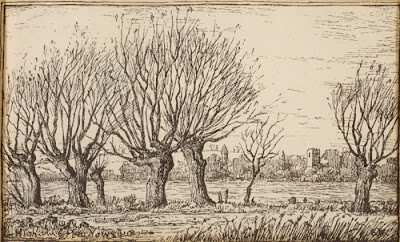"He saw a ghost in Stinsford Churchyard on Christmas Eve, and his sister Kate says it must have been their grandfather upon whose grave T. H. had just placed a sprig of holly -- the first time he had ever done so. The ghost said: 'A green Christmas' -- T. H. replied 'I like a green Christmas.' Then the ghost went into the church, and, being full of curiosity, T. followed, to see who this strange man in 18th century dress might be -- and found -- no-one. That is quite true -- a real Christmas ghost story."
Florence Hardy, letter to Sydney Cockerell, in Michael Millgate (editor), Letters of Emma and Florence Hardy (Oxford University Press 1996).
How like Hardy! Rather than being frightened out of his wits, he matter-of-factly converses with the spirit as if it was nothing out of the ordinary, blithely responding: "I like a green Christmas." Wonderful. Just like one of his poems.
Harry Bush (1883-1957), "The Christmas Tree" (1933)
The fact that Hardy's ghost conversation took place on Christmas Eve fits well with his Christmas poems, which often have a foggy, gloomy setting, and which are usually marked by the presence of wraiths or wraith-like humans. This is true of the following two poems, and yet the poems have an oddly cheerful feeling to them -- proving that Hardy is no Scrooge.
A Nightmare, and the Next Thing
On this decline of Christmas Day
The empty street is fogged and blurred:
The house-fronts all seem backwise turned
As if the outer world were spurned:
Voices and songs within are heard,
Whence red rays gleam when fires are stirred,
Upon this nightmare Christmas Day.
The lamps, just lit, begin to outloom
Like dandelion-globes in the gloom;
The stonework, shop-signs, doors, look bald;
Curious crude details seem installed,
And show themselves in their degrees
As they were personalities
Never discerned when the street was bustling
With vehicles, and farmers hustling.
Three clammy casuals wend their way
To the Union House. I hear one say:
"Jimmy, this is a treat! Hay-hay!"
Six laughing mouths, six rows of teeth,
Six radiant pairs of eyes, beneath
Six yellow hats, looking out at the back
Of a waggonette on its slowed-down track
Up the steep street to some gay dance,
Suddenly interrupt my glance.
They do not see a gray nightmare
Astride the day, or anywhere.
Thomas Hardy, Winter Words in Various Moods and Metres (1928). A "casual" was either an occasional laborer with no fixed employment or someone who was in need of temporary charitable relief. The "Union House" was the workhouse in Dorchester, Dorset.
The poem, with its empty, foggy street and its lamps "like dandelion-globes in the gloom" (a lovely description), has a Dickensian "nightmare" feel to it. But Hardy never states exactly what the "nightmare" is.
Ben Nicholson (1894-1982), "1930 (Christmas Night)" (1930)
The following poem is a variation on the same theme.
Christmastide
The rain-shafts splintered on me
As despondently I strode;
The twilight gloomed upon me
And bleared the blank high-road.
Each bush gave forth, when blown on
By gusts in shower and shower,
A sigh, as it were sown on
In handfuls by a sower.
A cheerful voice called, nigh me,
"A merry Christmas, friend!" --
There rose a figure by me,
Walking with townward trend,
A sodden tramp's, who, breaking
Into thin song, bore straight
Ahead, direction taking
Toward the Casuals' gate.
Thomas Hardy, Ibid. The "Casuals' gate" was one of the entryways to the Union House mentioned above.
Which in turn leads me to say to all of you whose visits here throughout the year are much-appreciated: "A merry Christmas, friend!"
Robin Tanner (1904-1988), "Christmas" (1929)




























